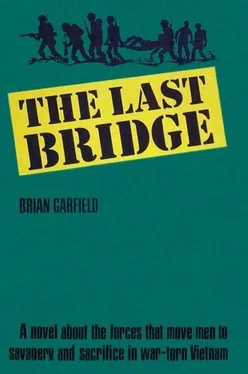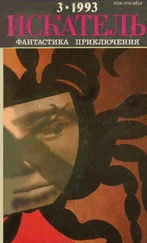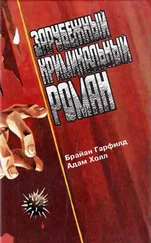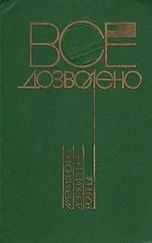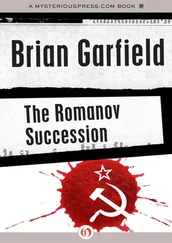Tyreen put his submachine gun over his shoulder on its sling. He scraped a hand across his mouth. “You’ve been expecting us, Miss?”
“Yes. I have come to meet you because there is no one else. The village has not yet elected a new leader. I will tell you what my brother would have told you, and try to do what he would do.”
“Do you think they made your brother talk?”
Saville cleared his throat. The girl’s face was invisible under the hat. Tyreen said, “I’m sorry. We ought to know. If he was made to talk, then they’ll be expecting us.”
“My brother did not talk.”
“You’re sure?”
“I am quite sure, Colonel. My brother was their prisoner twice before, and he did not talk then.”
“All right,” Tyreen said.
The girl turned. “Please follow me.” She walked into the rain forest.
There was the odor of food cooking in the jungle clearing. Boiling rice steamed in big pots over open fires sizzling in the rain. A dark, humped water buffalo stood in an open shed beside a hut thatched with rushes. There were three small huts and a pagoda. A tribesman stood outside the pagoda, armed with a semiautomatic rifle. He wore khaki pants and a loose black Oriental shirt. Crossed ammunition bandoliers hung from his shoulders. Tyreen caught the smell of burning joss sticks in the pagoda. Under a shelter two old people sat crosslegged: an old woman smoking a cigar, and an old man, scrawny with a potbelly. By them on a platform lay the shape of a human body wrapped in a sheet, the face covered by white paper. Incense smoldered in pots. The young woman spoke quietly, and the two old people got to their feet. They placed their palms together and bowed slowly toward the covered corpse and then toward Tyreen’s party. Lin Thao said, “These are my father and my mother, and that is my brother.”
Corporal Smith spoke very low into Tyreen’s ear:
“Her brother’s lucky. The last village chief here was tied up to a stake in front of the pagoda. The Vietminh ripped his belly open and left him hang there with his guts spilled out.”
Theodore Saville’s face was wet with rain. He blotted his face into the crook of his elbow. Tyreen said, “Let’s have a look at the map of Chutrang, Theodore.”
Saville had been watching the girl. He flashed angry eyes at Tyreen. “It’s a bad thing about your brother, Miss.”
She said, “He has nothing to fear now.”
J. D. Hooker’s eyes were hooded. “You act real busted up, don’t you? What’s with you people?”
She answered coolly. “Haven’t you heard of the stoic Oriental, Sergeant? We do not cry.” Presently Hooker looked away.
Tyreen said, “Theodore.”
Saville wheeled on him. “Just hold your Goddamn horses, David.”
“Tell that to Eddie Kreizler,” Tyreen said bleakly.
Saville said to Corporal Smith, “Where can we get out of the rain for a minute?”
“I will take you,” said Lin Thao. She made a gesture and walked toward a hut thatched with rushes.
It was like an Indian jacal Tyreen had seen in New Mexico. The girl turned up an oil lantern. The flame wavered on low oil, filling the hut with flat yellow light. Tyreen’s attention lay wholly against the girl.
She looked at him as she might look at a man under sentence of death. Her face was small and fragile. She was brown and oval-eyed; she appeared very young, but not frightened. Her mouth had a strange shape, as though she had been biting the lips. Tyreen locked eyes with her for a studied interval, but there was no break in her composure; she did not blink.
A narrow, bony man entered, a graceless tribesman with voracious eyes. He carried several bowls of stew. The girl apologized: “It is not our best, but you must eat.”
“ Nuoc mam, ” said Corporal Smith.
Theodore Saville said, “Thank you, Miss.” He sat down and began to eat.
Tyreen said, “Let’s see that map, Theodore.”
Saville’s eyes came up slowly. He drew the oilskin map pouch from his jacket and spread the map on the floor. Tyreen squatted beside it, deep in study. “That’s the guardhouse?”
“Eat,” said Lin Thao. “One of our people watched the city with glasses. He saw them take Captain Kreizler out of the jail and into the headquarters.”
“How long ago?”
“It has not been an hour.” She waved a small brown hand at him. “Is the food bad?”
Tyreen tasted it. “It’s fine. What about Lieutenant Chinh?”
“The guards killed him outside the jail. But they did not shoot Captain Kreizler.”
“Sure,” murmured Theodore Saville through a mouthful of stew.
Tyreen tasted the fermented sauce and bolted the food while his eyes traveled around the map. Saville said, “Figure to slog it, or use the truck?”
“The truck, I think.” Tyreen’s eyes were sunken and fiery. He put his bowl aside. “Lin Thao. How many men with weapons have you got?”
“We have fifty in the village, but only eight are here now.”
“Smith, what kind of weapons have they got?”
“Small arms and grenades, sir. One light mortar.”
Tyreen examined the girl like a man studying the entrails of an oracular goat. He put his finger on the map. “How long would it take your people to walk from here to the electric power station?”
“Thirty minutes, if there are no patrols on the path.” Her answer was quick and positive.
“Is there a heavy guard on the power station?”
Smith spoke up: “One machine gun squad. Three guns.”
The girl said, “You would have us sabotage the electric station?”
“To draw the army out of Chutrang.” Tyreen rubbed his eyes with forefinger and thumb. “Can your people do that?”
“If it will help Captain Kreizler, we can try, Colonel.”
Tyreen cut off a curse. “I feel like a fool talking to a woman like this.”
“There is no one else. The people will listen to me.”
He looked cross and sulky. “Make a lot of noise. Throw grenades and do a lot of shooting. Try to knock out the city power cables. Make as much noise as you can, but tell your people not to take risks. They don’t have to be brave. It won’t help for anybody to get killed.”
Lin Thao said, “The army will come up from the city.”
“When they do, your people disappear.”
She spoke to Corporal Smith. Smith answered in the Montagnard dialect, and Lin Thao said to Tyreen, “We shall do as you say.”
He looked at her feet. Her sandals were cut from automobile tires. She probably did not weigh one hundred pounds. She offered him a jar and said, “Rice whisky,” and Tyreen shook his head. J. D. Hooker reached for the jar, and Tyreen said, “No.” The girl withdrew the whisky. Hooker straightened, but did not speak, and the girl said:
“There is an alley near the soldiers’ compound.” She touched the map. “If you wish to use the truck again, you should hide it in the old garage where tractors and wagons were repaired. The garage is not used now. The mechanies are in jail. Go with care, because there are many patrols. They move their stations all the time. Watch for them in the shadows. They are frightened of the light.”
“Like rats,” said Theodore Saville.
“No,” Lin Thao said, “they are poor men with families. They only earn their food and try to keep alive.”
Tyreen stirred; his eyes were intolerant. “Death is the same whether you fear it or not.” He picked up the map and got to his feet; he was not steady and fought briefly for balance. He resented the way the girl looked at him, with sudden concern; she had no right to it.
But all she said was, “They have an electric alarm fence around the jail. It has its own generator, and if we cut off the main power cables that will not turn the alarm off. I tell you this because they may move Captain Kreizler back into the jail.”
Читать дальше
